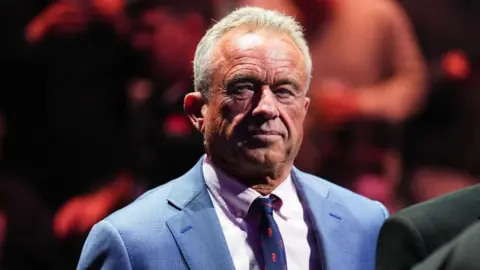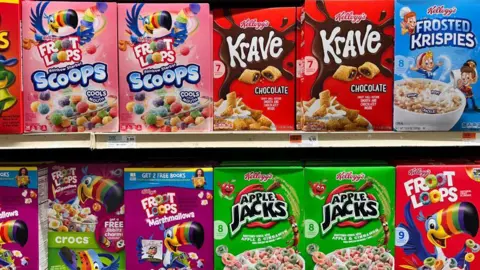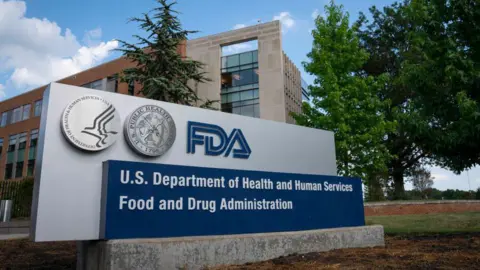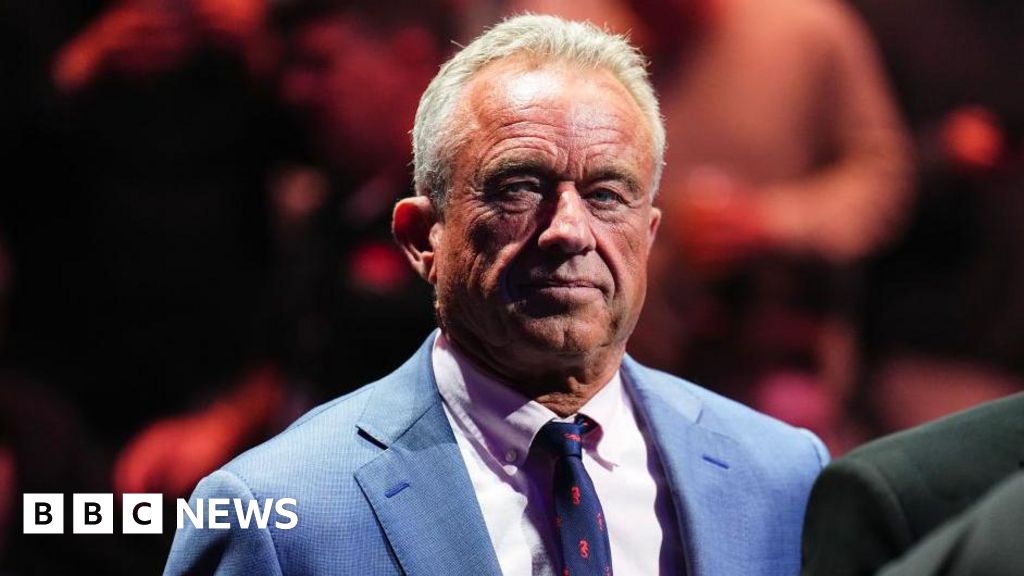 Getty Images
Getty ImagesRobert F Kennedy Jr has his sights set on changing the way Americans eat and drink.
From the dyes in Fruit Loops cereal to seed oil in chicken nuggets, Kennedy — President-elect Trump’s pick to lead the Department of Health and Human Services (DHHS) — has long spoken out against ingredients he says harm the health of Americans.
‘We betray our children by letting them through [food] industries are poisoning them,” Kennedy said at a rally in November, after ending his independent presidential bid and endorsing Donald Trump.
But if Kennedy wants to target junk food, he’ll first have to shake up the country’s food regulations — and take on Big Food.
“What he’s suggesting is tackling the food industry,” says former New York University nutrition professor Marion Nestle. “Will Trump support him in this? I won’t believe it until I see it.”
The former environmental lawyer — who still needs Senate confirmation — is considered by many to be a controversial choice given his history of making baseless health claims, including that vaccines can cause autism and that Wi-Fi technology causes cancer.
Still, some of his ideas about reforming the FDA have drawn support from health experts, lawmakers and concerned consumers — including some Democrats.
Kennedy “will help make America healthy again by shaking up HHS and FDA,” Democratic Colorado Governor Jared Polis wrote on social media this week, welcoming his appointment. After receiving public backlash for praising him, Polis qualified his endorsement by writing on social media that “science must remain THE cornerstone of our nation’s health policy.”
Making America healthy again
In the run-up to the election, Kennedy – a former Democrat – came up with several ideas for tackling chronic diseases under his slogan ‘Make America Healthy Again’.
He has often advocated eliminating ultra-processed foods – products modified with added fats, starches and sugars, such as frozen pizzas, chips and sugary breakfast cereals, which are linked to health problems such as cancer, cardiovascular disease and diabetes.
Focusing mainly on school lunches, he told Fox News: “We have a generation of children who are swimming in a toxic soup right now.”
Part of Kennedy’s new mandate includes overseeing the US Food and Drug Administration (FDA), which has more than 18,000 employees.
The agency is responsible for ensuring the safety of pharmaceutical products and the U.S. food supply, but has come under fire in recent years from some lawmakers and consumer groups, who have accused it of a lack of transparency and action on food safety.
The 70-year-old has vowed to take a sledgehammer to the agency, saying firing employees is part of a “corrupt system”.
“There are entire departments, like the food division of the FDA … that need to go, that are not doing their jobs,” Kennedy told MSNBC this month.
He has also pushed for the elimination of food dyes, including Red No. 3, and other additives banned in other countries.
The former Democrat has also raised more controversial health issues, including fluoride in drinking water, which he believes should be banned altogether, and raw milk, which he believes has health benefits despite the increased risk of bacterial contamination.
He’s also going after seed oils, writing on social media that Americans are being “unknowingly poisoned” by products like canola and sunflower oil used in fast food.
 Getty Images
Getty ImagesWhat the evidence says
Several public health experts support Kennedy’s goal of tackling ultra-processed foods, which they say are eaten at a much higher rate in the US than many other countries.
“It’s just exciting to hear someone advocating to do something about chronic diseases,” Ms. Nestle said.
Kennedy’s goal to get rid of certain food additives and dyes could also be helpful, said Dr. Peter Lurie, executive director of the Center for Science in the Public Interest, a nonprofit organization that advocates for food safety.
The former FDA official said that several food dyes, including Red No. 3 – which is banned in California – should also be blocked by the US government due to concerns about carcinogens.
The FDA has reversed Kennedy’s claim that the US allows thousands of additives that are banned in the European Union. A spokesperson said it was necessary to “dig deeper and understand the context behind the numbers” when comparing regulations in the US and EU, which use different methodologies.
But public health experts and former officials said some of Kennedy’s goals were not worthwhile — and in some cases even harmful.
Research has shown that drinking raw milk that has not been pasteurized – a process that helps kill bacteria – can make people sick or even kill them.
“There is no evidence of any nutritional benefit of any magnitude resulting from non-pasteurization of milk,” said Dr. Lurie.
Kennedy’s proposal to remove fluoride from drinking water could also be problematic because fluoride, at the low levels found in water, has been proven to improve dental health, Ms. Garner said.
Removing it from the water supply would also be beyond its jurisdiction because fluoride levels are controlled by states.
And his claim that seed oils are helping drive the obesity epidemic isn’t scientifically based either, Dr. Lurie said.
“We see no evidence for that. In fact, they appear to be important products in that they replace saturated fats, such as butter, he said.
Tackling big food
Food reforms, while long part of the public health debate, may also be simply unrealistic, both politically and bureaucratically, some experts say.
“It’s a lot more complicated than he makes out,” Dr. Lurie said. “These are real challenges, and you will encounter industry opposition at every turn.”
First, the FDA has no authority over the entirety of “ultra-processed foods,” several former officials told the BBC.
Instead, they said the process is more complicated. Both the United States Department of Agriculture and the FDA regulate the food industry. The FDA doesn’t make the rules; it implements policies passed by Congress and works to limit unhealthy foods by imposing limits and labeling certain nutrients, such as sodium and saturated fat.
Kennedy’s comments “create great political rhetoric,” Ms. Garner said. “In my opinion, I don’t see how that could be feasible without drastic changes in other policies and infrastructure.”
He also will face industry backlash over proposals to ban pesticides and genetically modified organisms commonly used by U.S. farmers, former FDA officials said.
“The companies will complain,” said Rosalie Lijinsky, a former FDA official of 33 years.
The industry is used to limited oversight from both Democrats and Republicans — including under Trump’s first term — while many of Kennedy’s goals would involve even more regulation.
Several food industry groups met with lawmakers ahead of Kennedy’s nomination this month to lobby against him, Politico reported last month.
Republican Senator Chuck Grassley of Iowa said this week that he planned to meet with Kennedy before his confirmation hearing and “spend a lot of time teaching him about agriculture.”
Kennedy’s position also puts him at odds with newly elected President Trump, a longtime fast-food enthusiast who pushed to roll back stricter health requirements for school lunches during his first term.
“You get some ideas that make sense to a certain extent, but they are exactly the kind that this administration is hostile to,” Dr. Lurie said.
In a statement to the BBC, the Food Industry Association, which represents food retailers, producers and manufacturers such as General Mills, said it looks forward to working with Trump’s team to “ensure that food and drug policy is informed by science.” remains well-founded, because of the complexity of the regulations”.
The industry complaints about Kennedy’s agenda come as no surprise, said Jeff Hutt, spokesman for the political action committee Make America Healthy Again, which is pushing Republican lawmakers to confirm Kennedy.
The goal of the health movement, Hutt said, is to “prioritize America’s well-being over corporate profits.”
“Even though the idea of banning ultra-processed foods is not politically possible, it is a conversation we need to have,” he said.
 Getty Images
Getty ImagesRoad to change
Kennedy could still work within existing U.S. regulatory frameworks to improve U.S. food systems, former officials said.
Ms. Nestle said Kennedy could adopt ultra-processed foods by changing the U.S. Dietary Guidelines, which set nutritional standards for industry and federal government programs including school lunches and military meals.
“They have a huge impact on the food industry,” Ms Nestle said. “That would make a big difference.”
The guidelines are updated every five years by the U.S. Department of Agriculture and the DHHS, which has previously said there is insufficient evidence against ultra-processed foods.
Still, officials and nutritionists expressed concern about the means by which Kennedy has proposed to implement his agenda, including firing the FDA’s nutritionists.
The move would have major implications for food safety, Ms. Lijinsky said. “If you lose your top experts, you’re going to have problems,” she said.
Ultimately, Ms. Garner said it is difficult to separate some of Kennedy’s more reasonable goals for food improvement from the false health claims he has spread.
“There’s an opportunity here,” Ms. Garner said.
“But I think there are legitimate concerns based on other issues and how his approach to those issues could play a role here.”



